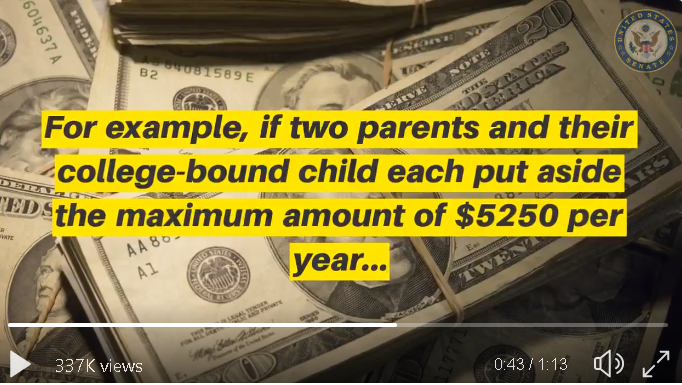- Sep 13, 2002
- 94,061
- 190,267
- 113
Words almost fail me here. This is, this is just. JFC.
Follow along with the video below to see how to install our site as a web app on your home screen.
Note: This feature may not be available in some browsers.

What 18 year old has any college debt? Seems pretty simple. 401k plans can be set up to allow you to borrow from themYeah, I know a TON OF 18-year-olds who throw around $5K into their 401(k)each year!
What freaking planet do these asshats even LIVE ON?

but there are tons and tons and tons of people who pay no taxes. or very little. especially youngsters right out of school. they don't earn enough.All student loan payments should be deductible on your income taxes, not just interest payments for people making less than $60,000 per year. That seems like a pretty reasonable, common sense compromise to me.
This. A withdrawal with absolutely no taxes or penalties attached. Just a direct transfer of funds from one account to another.The only way this would make financial sense would be if you don't get taxes on the withdrawal
Doesn’t this just encourage poor personal finance decisions by sacrificing long term growth for the immediate satisfaction of debt repayment?

I’ve said this for years. Much more practical solution than wiping out debt with one shot.All student loan payments should be deductible on your income taxes, not just interest payments for people making less than $60,000 per year. That seems like a pretty reasonable, common sense compromise to me.
*Not a financial planner, and didn't stay at a Holiday Inn last night*
Don't employers/plan providers get to dictate many stipulations of 401ks, unlike traditional IRAs? Could an employer already allow something like this? They often allow loans with or without repayment for primary homes/first time home buyers/foreclosure avoidance right? Could they, along with the plan provider, allow more? Or is that restricted?
I feel like this is a stupid question.
Thinks to himself "a math problem...I bet I can quickly quantify how mind-numbingly, colossally f---ing stupid this plan is"
The average amount of student debt is $37,172. The average interest rate on that debt is 4.29% per year with an average of about 10 years on the loans.
(source: https://www.debt.org/students/)
The average annual S&P 500 return since 1957 when it went to 500 stocks is 7.96% (all time it approaches 10%)
(source: https://www.investopedia.com/ask/answers/042415/what-average-annual-return-sp-500.asp)
Now, most people are not lucky enough to be able to have money in a retirement account AND also have this level of student loans. But, for those that are, you are presented with a choice of either paying more money back to avoid the 4.29% rate, or investing/keeping that money active in the market at a 7.96% rate.
If you tap your 401K to make a one time payoff of the loan: you will lose out on $16,451.95 of extra return you get by keeping it in the market over 10 years.
This should be obvious - return in the market has historically been higher than the interest on loans.
So, barring a collapse of the market, the very few people who could benefit from this plan would have to be VERY mind numbingly, colassally f---ing stupid to take advantage of it.*
* The only scenario where this is a good investment strategy is if the stock market underperforms historical long term averages. Is Rand Paul predicting a market collapse or something?
Well yeah and that's why it's a bad idea. You are allowed to save pre-tax money for retirement, not spend it along the way for fripperies that entertain you. Student loans for an entertaining education that has little or no chance of making enough money to pay for said education is a frippery.There are IRS laws about withdrawing money from these. You need to be 59.5 to make a withdrawal without a penalty. There may be some exclusions but someone else would know better than me.
LOL, the bar set by the modern GOP is hilariously low, that is for sure.I'll give Rand a small amount of credit, at least he didn't encourage kids to go out and buy gold, or produce a racist news letter for decades and then says he had no connection to it even though his name was on it.
I won’t argue with your math, that’s pretty basic. I will argue that doing it that way could create cash flow issues for individuals with high amounts of debt. The student loan has to be paid AND they would need to have extra money (after basic living expenses) to contribute to the 401k.Thinks to himself "a math problem...I bet I can quickly quantify how mind-numbingly, colossally f---ing stupid this plan is"
The average amount of student debt is $37,172. The average interest rate on that debt is 4.29% per year with an average of about 10 years on the loans.
(source: https://www.debt.org/students/)
The average annual S&P 500 return since 1957 when it went to 500 stocks is 7.96% (all time it approaches 10%)
(source: https://www.investopedia.com/ask/answers/042415/what-average-annual-return-sp-500.asp)
Now, most people are not lucky enough to be able to have money in a retirement account AND also have this level of student loans. But, for those that are, you are presented with a choice of either paying more money back to avoid the 4.29% rate, or investing/keeping that money active in the market at a 7.96% rate.
If you tap your 401K to make a one time payoff of the loan: you will lose out on $16,451.95 of extra return you get by keeping it in the market over 10 years.
This should be obvious - return in the market has historically been higher than the interest on loans.
So, barring a collapse of the market, the very few people who could benefit from this plan would have to be VERY mind numbingly, colossally f---ing stupid to take advantage of it.*
* The only scenario where this is a good investment strategy is if the stock market underperforms historical long term averages. Is Rand Paul predicting a market collapse or something?
Fair enough. All I would say is that if you believe you don’t need the money over a 10 year period it is hard to justify any early payoff of the student loan at a <5% interest rate. In most 10 year periods you will do better to invest the money in the market (or keep money already invested in the market). Unfortunately, many people do neither and just spend the extra money - a far worse decision.I won’t argue with your math, that’s pretty basic. I will argue that doing it that way could create cash flow issues for individuals with high amounts of debt. The student loan has to be paid AND they would need to have extra money (after basic living expenses) to contribute to the 401k.

